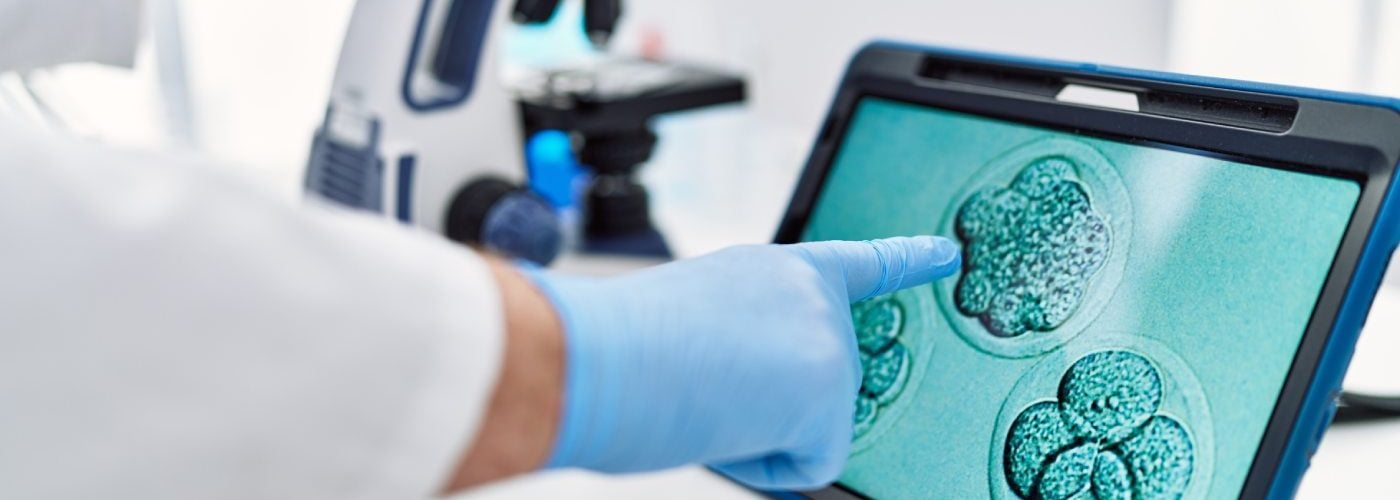
Natural Cycle Embryo Transfer is a new protocol established at IVI, for ovulatory patients to undergo embryo transfer during their natural cycle. This approach reflects our commitment to adopting the latest improvements for our patients. We alreday showed this when we became the pioneers in Spain for single embryo transfer per cycle. To better explain what this protocol entails, the benefits to transfer in natural cycle, and the circumstances in which we recommend this procedure, we have consulted with Dr. Vanessa Vergara, Medical Director of IVI in Iberia, Latin America, and the Czech Republic.
What is natural cycle embryo transfer?
Natural cycle embryo transfer involves leveraging the normal, natural growth of the endometrium, which is stimulated by the hormones produced by the ovaries during a natural cycle. In this process, we do not use hormone replacement therapy (HRT). This means no hormonal medication is administered to prepare the endometrium for the transfer. The body’s own hormones naturally prepare the endometrium for embryo transfer.
Will hormone replacement therapy still be used?
Yes, HRT will still be used for patients who do not ovulate regularly. Hormone replacement therapy remains an option for endometrial preparation in certain patients. Based on a personalized evaluation, the doctor will recommend the most appropriate treatment for each case.
Who is natural cycle embryo transfer recommended for?
Natural cycle embryo transfer is suitable for all patients who are able to ovulate.
It is important to note that natural cycle embryo transfer has already been offered at our clinics as part of our philosophy of shared medical decision-making with patients. However, we are now implementing this practice more broadly across all our clinics and processes, demonstrating IVI´s commitment to patient safety and well-being.
In which cases will this protocol be implemented?
For ovulatory patients, the natural cycle transfer protocol can be applied in those who have vitrified embryos or are undergoing egg donation. Specifically, it is recommended in the following cases:
Patients undergoing PGT-A
Firstly, for patients undergoing preimplantation genetic testing (PGT-A) to detect chromosomal abnormalities, as the embryos must be vitrified while waiting for the diagnostic results.
When is PGT-A recommended?
- For patients aged 35 or older
- Women with two or more unsuccessful assisted reproduction cycles
- Patients with recurrent miscarriages of unknown cause
- Cases with previous pregnancies involving chromosomal abnormalities, especially during assisted reproduction treatments
- Couples where the sperm shows meiotic abnormalities or has a low sperm count
Patients with vitrified embryos
Secondly, for patients who, for any medical reason, have vitrified embryos, as well as those undergoing a second or third transfer in a cycle.
Recipients of donated eggs
Thirdly, for patients receiving donated eggs, as vitrification is required after fertilization to synchronize the transfer with endometrial preparation.
When might a patient need donated eggs?
- In cases of poor egg quality
- For patients with ovarian failure and no spontaneous menstruation due to menopause
- In cases of previous IVF failure
- For women of advanced maternal age (38 or older)
This protocol applies to treatments using either partner or donor sperm and is always aimed at making the treatment as safe as possible for our patients.
Why do we support natural cycle embryo transfer?
Primarily because of the benefits it offers our patients. With natural cycle embryo transfer, treatments and pregnancies are made safer by:
- Reducing the risk of obstetric complications during pregnancy, with the most significant being hypertensive disorders (such as preeclampsia)
- Lowering the risk of cesarean section and postpartum hemorrhage
- Reducing the use of medication, as estrogen administration is eliminated, and progesterone use is minimized
- Lowering the cost associated with medication
- Furthermore, this protocol does not involve additional costs compared to other approaches
In summary, natural cycle embryo transfer enhances the safety of both mother and baby while also improving the overall well-being of the patient.
If you want to become a mother and need help with assisted reproduction to realize your family plans, IVI is here to help. You can provide your details in the contact form below, and our team will reach out to schedule an initial consultation or provide more information.





Comments are closed here.